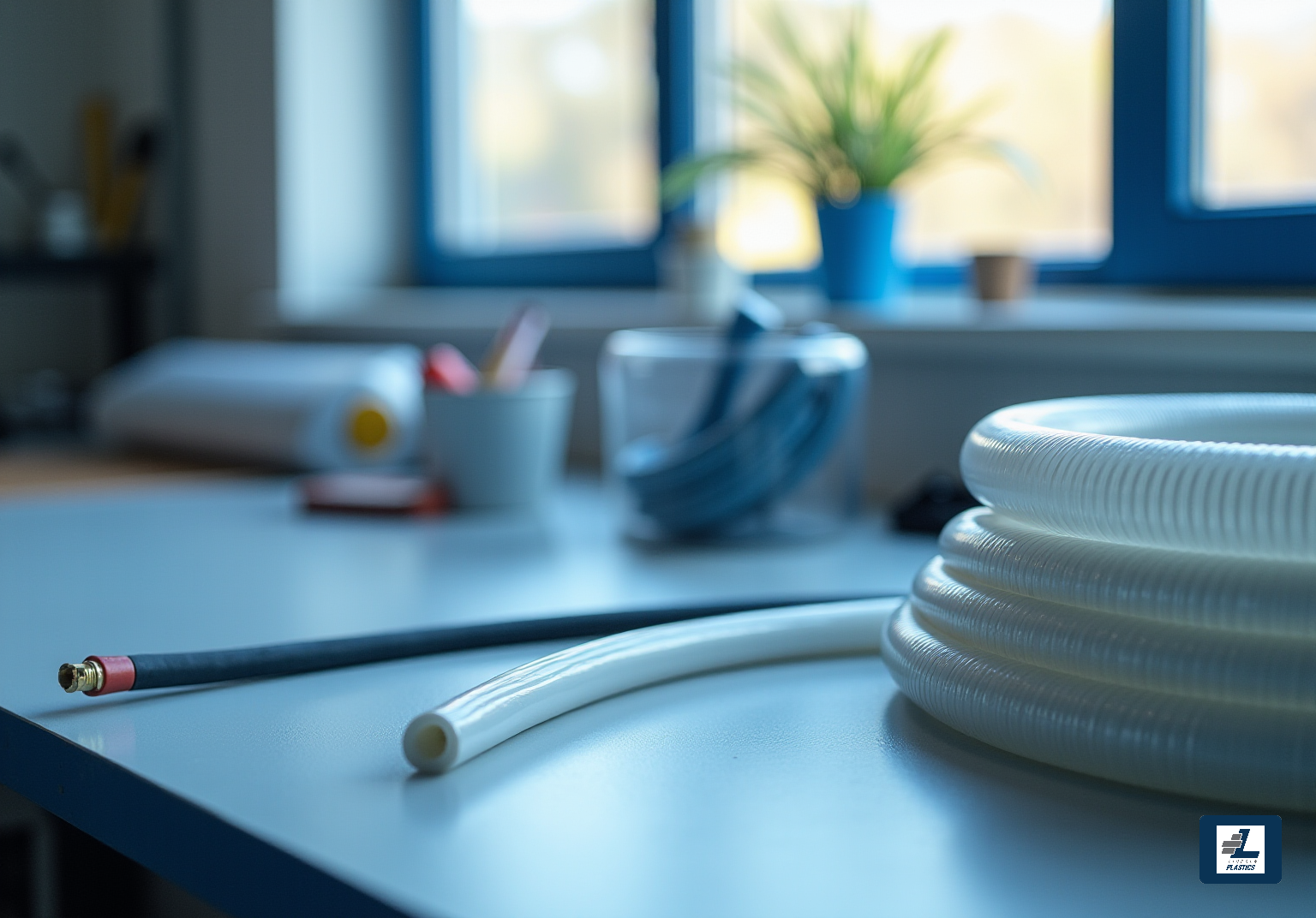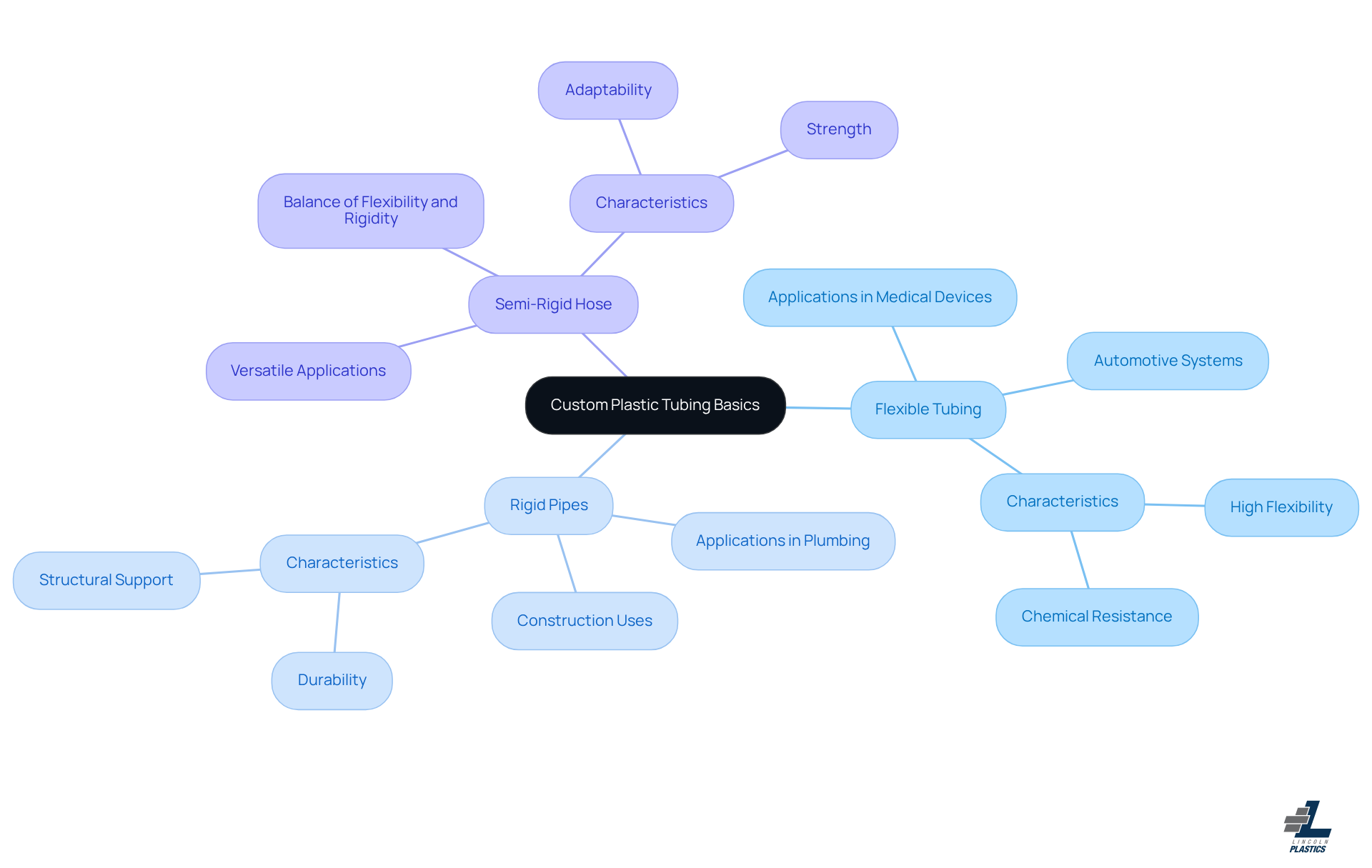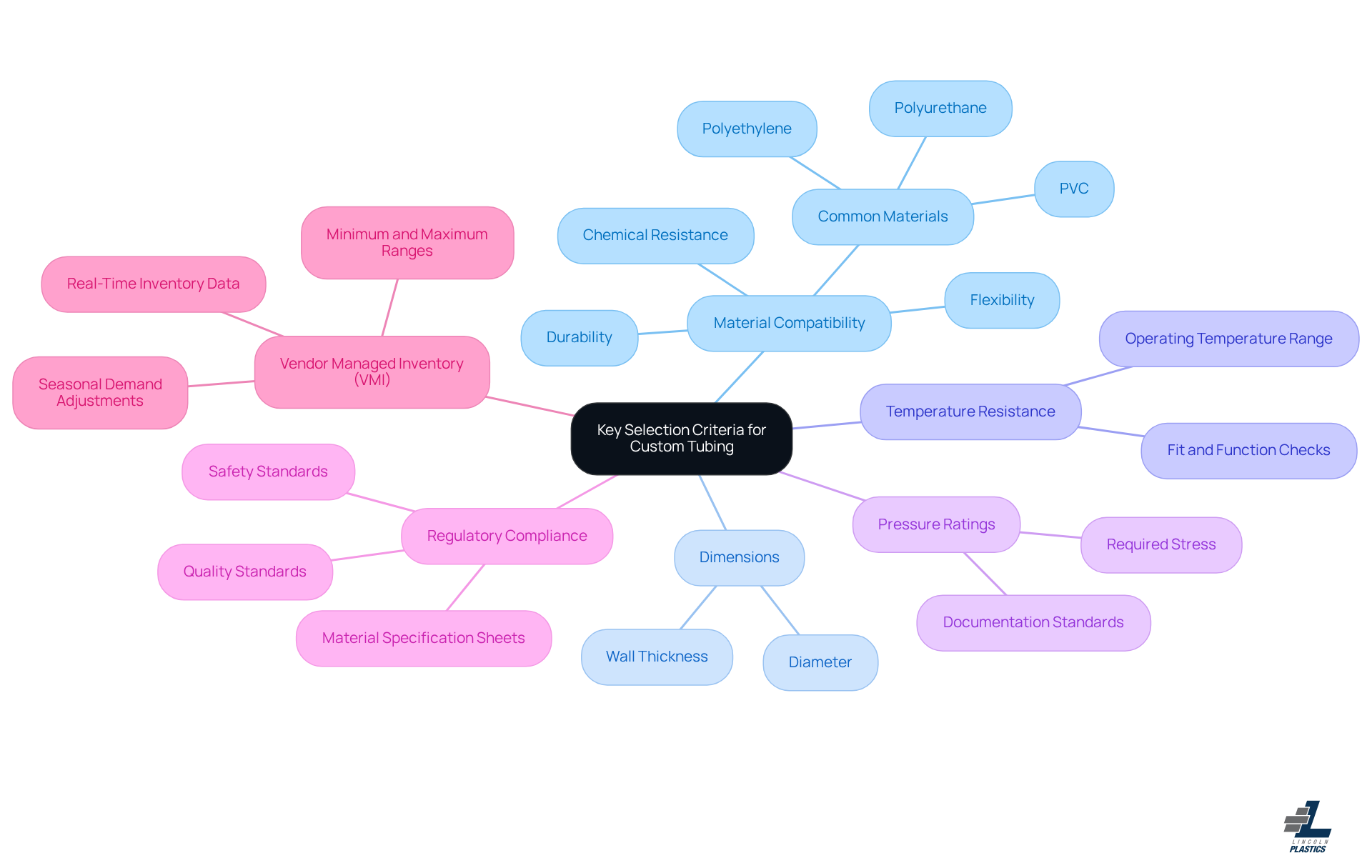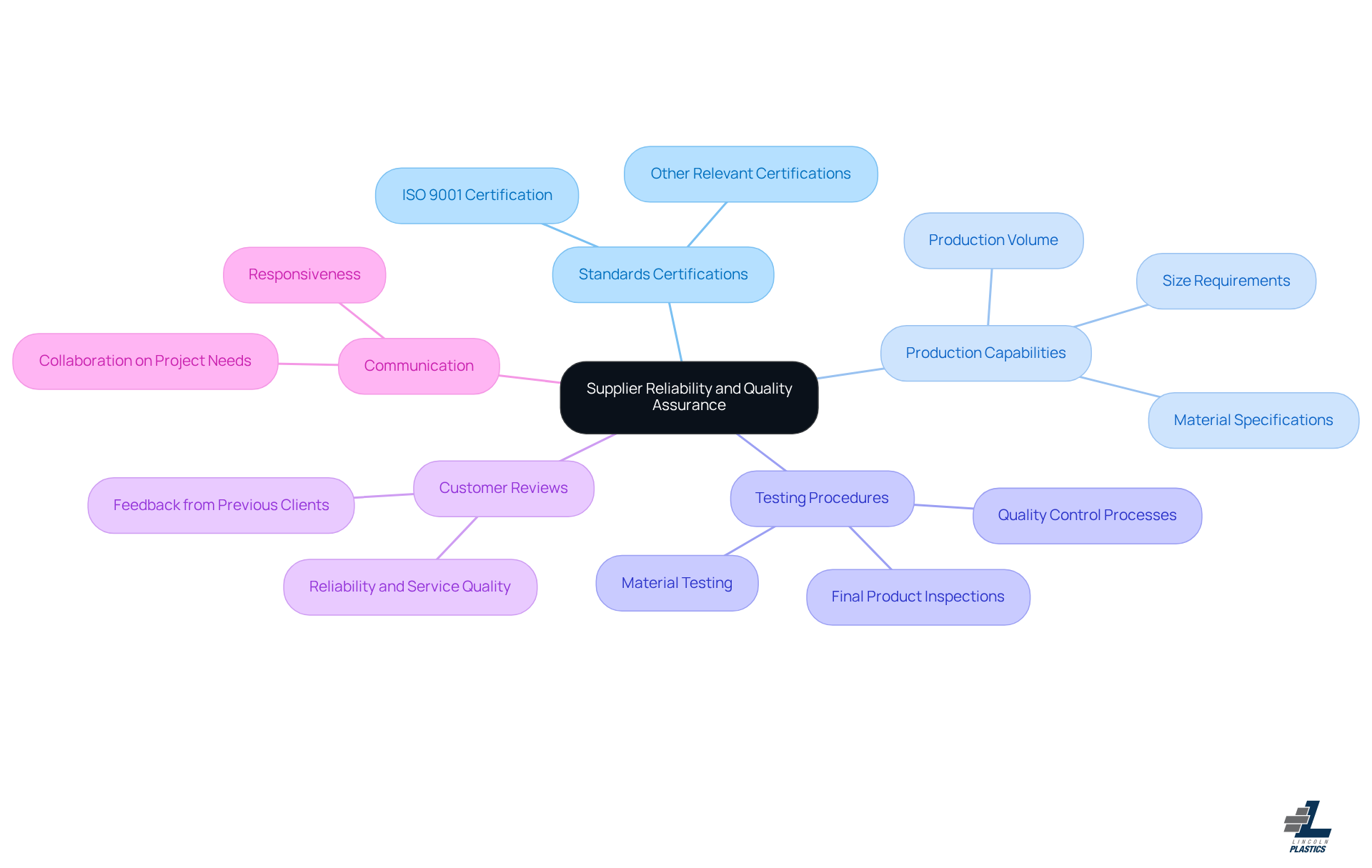
4 Steps to Choose Reliable Custom Plastic Tubing Solutions
Overview
So, what’s the main goal of this article? It’s all about helping you find reliable custom plastic tubing solutions in a structured way. We’ll walk through four key steps together. First up, you’ll want to evaluate:
- Material compatibility
- Dimensions
- Temperature resistance
- Pressure ratings
- Regulatory compliance
These factors are crucial to ensure the tubing you choose meets the specific needs of various industries, like medical, automotive, and construction.
Now, let’s talk about why this matters. Imagine you’re in a situation where the wrong tubing could lead to serious issues. By following these steps, you can avoid those headaches and ensure you’re making the right choice.
So, are you ready to dive in? Let’s explore how to make the best decisions for your projects!
Introduction
Navigating the world of custom plastic tubing can feel a bit overwhelming, right? It plays such a crucial role in industries like medical, automotive, and construction. Understanding the different types of tubing, their materials, and specific applications is key to making smart choices that ensure reliability and efficiency. But with so many options out there, how do you pick the right custom plastic tubing solution?
This guide is here to break it all down for you! We’ll simplify the selection process so you can confidently tackle your unique needs. So, let’s dive in and explore this together!
Understand Custom Plastic Tubing Basics
Custom plastic tubing is super important in a bunch of industries like medical, automotive, and construction. They can be grouped into three main types:
- Flexible Tubing: This type is perfect for situations where bending and movement are needed. Think about medical devices and automotive systems; they thrive in dynamic environments.
- Rigid Pipes: These guys are all about structural support. You’ll find in plumbing and construction, where durability and strength really matter.
- Semi-Rigid Hose: This one strikes a nice balance between flexibility and rigidity. It’s versatile enough for various uses, giving you adaptability without sacrificing strength.
Now, the type of polymer used to make each tube plays a big role in its characteristics, like strength, flexibility, and chemical resistance. For example, advancements in thermoplastic elastomers (TPEs) have really boosted the performance of flexible pipes in medical applications, making them clearer and more durable. In the automotive world, lightweight plastic pipes help with fuel efficiency while standing strong against tough conditions.
As we look ahead to 2025, it seems like flexible and rigid pipes are set to gain even more market share. This growth is driven by innovations that cater to the evolving needs of various industries. Understanding these basics is key when it comes to picking the right piping for specific uses. It ensures that operations are both dependable and effective. So, what do you think about custom plastic tubing? Are you ready to dive deeper into the world of custom plastic tubing?

Evaluate Key Selection Criteria for Custom Tubing
When you're on the hunt for custom plastic tubing, there are a few key things to keep in mind:
- Material Compatibility: Different materials bring different perks, like chemical resistance, flexibility, and durability. At Lincoln Plastics, we're here to help you choose the right material, such as custom plastic tubing, based on your needs and the environment it’ll be in. Common choices include PVC, polyethylene, and polyurethane.
- Dimensions: It's crucial to make sure the pipe's diameter and wall thickness fit your application perfectly. Our engineering team is ready to ensure that your rigid profiles are manufactured to those exact dimensions.
- Temperature Resistance: Think about the operating temperature range. You want to be sure the piping can handle the conditions it will face. We work closely with OEMs to make sure all standards are met, including checks for fit and function.
- Pressure Ratings: What are the pressure needs for your use case? Choosing piping that can withstand the required stress is essential. Our robust standards system includes specific documentation to ensure everything is accurate in manufacturing.
- Regulatory Compliance: If you're in sensitive sectors like medical or food, it's important to check that the pipes meet the necessary safety and quality standards. We can provide material specification sheets and ensure compliance with industry regulations.
- Vendor Managed Inventory (VMI): Have you thought about using to keep your inventory levels just right? By sharing your real-time inventory data with us, we can help you stay within your required minimum and maximum ranges, even adjusting for seasonal demands.
So, whether you're selecting materials or managing inventory, we've got your back! Let’s make the process smooth and tailored to your needs.

Identify Applications for Custom Plastic Tubing
Custom plastic tubing is utilized in many everyday applications. Let's take a look at a few of them:
- Medical Devices: Think about IV drips, catheters, and other medical equipment that needs flexible and sterile tubing. At Lincoln Plastics, we ensure our medical hoses meet strict standards. We have a solid standards manual and essential in-process evaluations to guarantee reliability in these critical uses.
- Automotive: Ever consider how fluid transport systems like brake lines and fuel lines work? Durability and flexibility are key here. Our robust assurance system includes specific inspections and records to ensure that all pipes meet the necessary automotive standards.
- Construction: In the world of plumbing and electrical uses, our tubing provides protective coverings and conduits. We collaborate closely with OEMs to tailor our conduit solutions, even sourcing colors that align with Pantone specifications for consistency across manufacturers.
- Food and Beverage: When it comes to transferring liquids, compliance with health regulations is a must. We're dedicated to maintaining high standards, ensuring that all our meet industry requirements, giving you peace of mind for food and beverage applications.
Understanding these applications can really help you choose the right custom plastic tubing for your specific needs. At Lincoln Plastics, we're here to leverage our engineering expertise and commitment to precision to support you in finding the best solutions.

Ensure Supplier Reliability and Quality Assurance
When it comes to picking a reliable supplier for custom plastic tubing, there are a few things to keep in mind:
- First off, standards certifications are super important. You’ll want to look for suppliers that have ISO 9001 certification or something similar. This gives you peace of mind that they meet certain quality benchmarks.
- Next, think about their production capabilities. Can they meet your specific needs regarding material, size, and production volume? For instance, Lincoln Plastics works closely with OEMs to ensure their products meet all necessary standards, including checks for 'fit and function'.
- Now, let’s talk about testing procedures. It’s a good idea to ask about the supplier's quality control processes, like material testing and final product inspections. At Lincoln Plastics, they use various check gauges to ensure a proper end-use fit. Plus, they have a robust assurance system that keeps detailed records for each plastic profile, documenting essential dimensions and in-process checks.
- Don’t forget to look into customer reviews. Researching feedback from previous clients can give you a sense of the and service quality.
- Lastly, consider the communication aspect. Make sure the supplier is responsive and eager to collaborate on your project needs. This is crucial for achieving successful outcomes.
By keeping these points in mind, you’ll be well on your way to finding the right supplier for your needs regarding custom plastic tubing!

Conclusion
Choosing the right custom plastic tubing solutions is a big deal, and it can really change the game for industries like medical, automotive, and construction. In this guide, we’ve laid out some key steps to help you pick tubing that not only meets your operational needs but also boosts reliability and performance across the board.
So, what should you consider? First off, get to know the different types of tubing—flexible, rigid, and semi-rigid—and the unique properties of each material. Think about factors like:
- Material compatibility
- Dimensions
- Temperature resistance
- Pressure ratings
- Compliance with regulations
By evaluating these aspects, you’ll be better equipped to make informed choices. And don’t forget about the supplier! Checking their certifications, production capabilities, testing procedures, and customer feedback is crucial for ensuring quality.
In a nutshell, spending some time on selecting the right custom plastic tubing can really pay off in terms of operational efficiency and product safety. By using the insights we’ve shared here, you can tackle the complexities of custom tubing solutions with confidence. Plus, connecting with knowledgeable suppliers and keeping up with industry trends will help you meet the changing needs and standards in the marketplace. Ready to dive in and make the best choice for your business?
Frequently Asked Questions
What are the main types of custom plastic tubing?
The main types of custom plastic tubing are flexible tubing, rigid pipes, and semi-rigid hose.
What is flexible tubing used for?
Flexible tubing is used in situations where bending and movement are needed, such as in medical devices and automotive systems.
Where are rigid pipes commonly found?
Rigid pipes are commonly found in plumbing and construction, where durability and structural support are essential.
What is the advantage of semi-rigid hose?
Semi-rigid hose offers a balance between flexibility and rigidity, making it versatile for various applications while maintaining strength.
How does the type of polymer affect custom plastic tubing?
The type of polymer used in custom plastic tubing affects its characteristics, including strength, flexibility, and chemical resistance.
What advancements have been made in flexible pipes for medical applications?
Advancements in thermoplastic elastomers (TPEs) have improved the performance of flexible pipes in medical applications, making them clearer and more durable.
How do lightweight plastic pipes benefit the automotive industry?
Lightweight plastic pipes in the automotive industry help improve fuel efficiency while being strong enough to withstand tough conditions.
What is the expected market trend for custom plastic tubing by 2025?
By 2025, flexible and rigid pipes are expected to gain more market share, driven by innovations that meet the evolving needs of various industries.
Why is it important to understand the basics of custom plastic tubing?
Understanding the basics of custom plastic tubing is important for selecting the right piping for specific uses, ensuring operations are dependable and effective.
List of Sources
- Understand Custom Plastic Tubing Basics
- Teknor Apex Introduces New Medical Grade Thermoplastic Elastomers (TPEs) for Demanding Biopharmaceutical Tubing Applications (https://teknorapex.com/en-us/news/teknor-apex-introduces-new-medical-grade-thermoplastic-elastomers-for-demanding-biopharmaceutical-tubing-applications)
- 2023 Custom Plastic Extrusion Industry Trends (https://inplexllc.com/blog/2023-plastic-extrusion-trends)
- Exploring the Versatility of Custom Plastic Tubing in Modern Applications (https://theridgewoodblog.net/exploring-the-versatility-of-custom-plastic-tubing-in-modern-applications)


